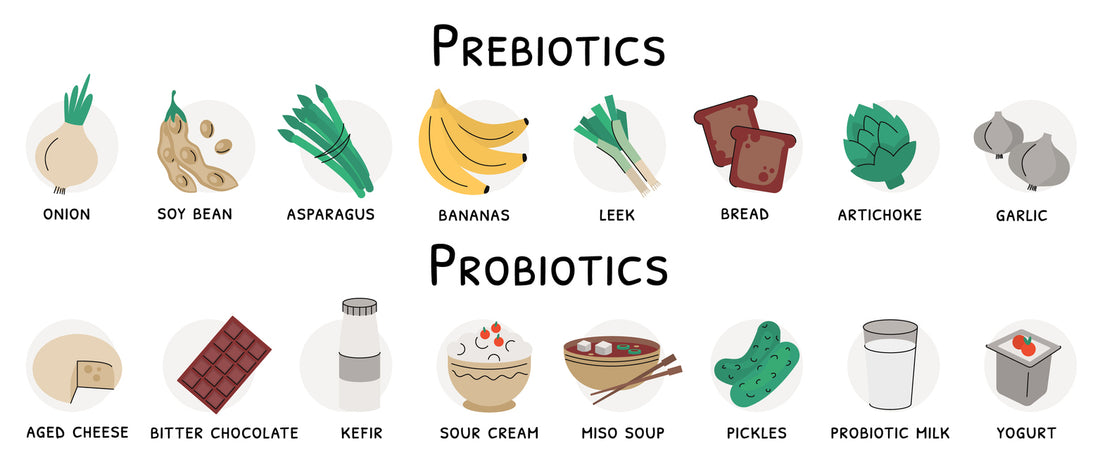Boost Your Wellbeing with Probiotics And Prebiotics: Uncover Their Benefits
In recent years, there has been a growing interest in the role of probiotics and prebiotics in promoting overall health and wellbeing. These two terms are often used interchangeably, but they actually refer to different things. Probiotics are live bacteria and yeasts that are good for your health, especially your digestive system. Prebiotics, on the other hand, are dietary fibers that act as food for the beneficial bacteria already present in your gut. Together, probiotics and prebiotics can have a powerful impact on your digestive health, immunity, mental health, and overall gut health.
Prebiotics for Digestive Health
When it comes to digestive health, prebiotics play a crucial role. They serve as a source of nourishment for the good bacteria in your gut, helping them to grow and thrive. By doing so, prebiotics help to maintain a healthy balance of bacteria in your digestive system. This balance is important for proper digestion and absorption of nutrients. Furthermore, prebiotics have been shown to improve bowel movements and reduce the risk of constipation. They can also help alleviate symptoms of various digestive disorders, such as irritable bowel syndrome (IBS) and inflammatory bowel disease (IBD).
Adding prebiotic-rich foods to your diet is an easy way to support your digestive health. Some common sources of prebiotics include garlic, onions, bananas, asparagus, and oats. These foods contain specific types of fiber that are not easily digested by your body but are instead utilized by the beneficial bacteria in your gut.
Prebiotics and Immunity
The health of your immune system is closely linked to the health of your gut. In fact, a large portion of your immune system resides in your gut. This is where prebiotics come into play. By promoting the growth of beneficial bacteria in your gut, prebiotics can help enhance your immune response. They do this by stimulating the production of certain immune cells and promoting their activity. As a result, consuming prebiotics can help strengthen your immune system, making you less susceptible to infections and illnesses.
In addition to supporting your immune system, prebiotics have also been shown to reduce inflammation in the body. Chronic inflammation is at the root of many diseases, including autoimmune conditions, heart disease, and certain types of cancer. By reducing inflammation, prebiotics can have a positive impact on your overall health and wellbeing.
Probiotics and Mental Health
While probiotics are primarily known for their benefits to the digestive system, research has revealed their potential to improve mental health as well. Your gut and brain are connected through a bidirectional communication pathway called the gut-brain axis. This means that what happens in your gut can influence your brain and vice versa. Probiotics can have a direct impact on this connection by altering the composition of bacteria in your gut and producing various substances that can affect brain function.
Several studies have shown that certain strains of probiotics can improve symptoms of anxiety and depression. In fact, some researchers have even coined the term "psychobiotics" to refer to these strains. They work by increasing the production of neurotransmitters like serotonin, which plays a key role in regulating mood. Other mechanisms through which probiotics may impact mental health include reducing inflammation, regulating stress response, and promoting the production of short-chain fatty acids that can benefit brain health.
Probiotics for Gut Health
When it comes to gut health, probiotics are the superheroes. These beneficial bacteria can help maintain the delicate balance of microorganisms in your gut and prevent the overgrowth of harmful bacteria. By doing so, they can protect against digestive disorders such as diarrhea, constipation, and irritable bowel syndrome (IBS). Probiotics can also aid in the digestion and absorption of nutrients, preventing malnutrition and boosting overall gut health.
In addition to their role in digestion, probiotics have been shown to have a positive impact on gastrointestinal conditions like inflammatory bowel disease (IBD) and Crohn's disease. They can help reduce inflammation, alleviate symptoms, and even promote the healing of the intestinal lining. Probiotics have also been studied for their potential to prevent and treat urinary tract infections, vaginal infections, and allergies.
It's important to note that not all probiotic strains are created equal. Different strains have different health benefits, so it's essential to choose the right probiotic for your specific needs. Look for a probiotic supplement that contains strains known to provide the benefits you're seeking, and consult with a healthcare professional if you have any specific health concerns.
Takeaway message
In conclusion, probiotics and prebiotics can have a significant impact on your overall wellbeing. By supporting your digestive health, boosting your immune system, improving your mental health, and maintaining a healthy gut, these powerful substances can help you feel your best. Consider incorporating prebiotic-rich foods into your diet and exploring probiotic supplements to harness the benefits of these remarkable substances. Your body will thank you for it!
Find this helpful?...Please Like, Share and Follow @greatermood also check out our other health topics here

